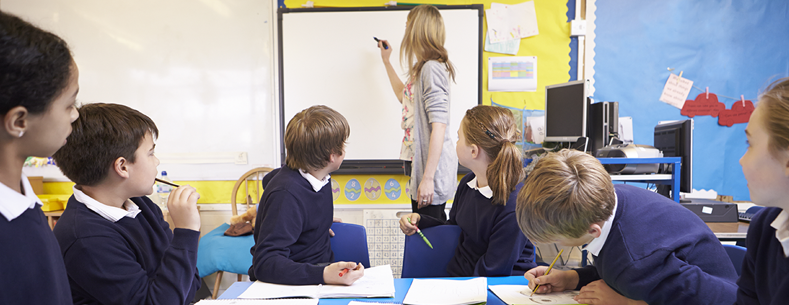Children’s education has been firmly in the spotlight since the start of the pandemic. It is within this context that, seven and a half years after Professor Graham Donaldson’s landmark Successful Futures review, many schools across Wales will finally begin teaching the new (age 3-16) Curriculum for Wales this September.
Successful Futures provided the blueprint for this new ‘purpose-based’ curriculum, with more emphasis on the skills needed for adult life and aiming to teach what matters.
Schools, teachers and other stakeholders were given a leading role in developing the new curriculum, which the Welsh Government hopes will complement its long-standing school standards agenda. Between 2020 and 2021, the Senedd then scrutinised and passed the Curriculum and Assessment (Wales) Act 2021 to establish the new curriculum.
This article provides some background ahead of the Minister for Education and Welsh Language’s Plenary statement on Tuesday about the Curriculum for Wales roll-out.
Information can also be found in the curriculum annual report just published by the Welsh Government.
How is the new Curriculum for Wales being rolled out?
The new curriculum will be introduced in all publicly funded nursery settings and primary schools this September. Secondary schools were given a choice of whether to teach it to Year 7 in 2022/23, as originally planned, or wait a further year until it also becomes statutory for Year 8 in September 2023.
The Curriculum for Wales will then be rolled out to additional older year groups, year by year, until reaching Year 11 in 2026/27. Nearly half of secondary schools have decided to introduce the new curriculum in Year 7 this September. They’re listed in the Commencement Order. The first cohort to take qualifications associated with the new curriculum will be 2026/27’s Year 11 (children who are now about to finish Year 6).
Sept 2022
Early Years
Primary School
Year 7 - optional for schools
Sept 2023
Early Years
Primary School
Year 7
Year 8
Sept 2024
Early Years
Primary School
Year 7
Year 8
Year 9
Sept 2025
Early Years
Primary School
Year 7
Year 8
Year 9
Year 10
Sept 2026
Early Years
Primary School
Year 7
Year 8
Year 9
Year 10
Year 11
What does the new Curriculum for Wales look like?
The new curriculum shifts away from a relatively prescribed content-based national curriculum at present to a purpose-based broad framework, within which schools will design their own curriculum.
Publicly funded nurseries providing education for 3 to 5 year olds can choose whether to adopt the early years curriculum the Welsh Government has provided for them or, like schools, design their own against the national framework.
The Welsh Government has published the curriculum framework on Hwb. Unlike the current national curriculum, there will be no programmes of study setting out exactly what must be taught.
In addition to the four purposes, the Curriculum for Wales will be structured around six Areas of Learning and Experience (AOLEs). The AoLEs are based on “statements of what matters” (i.e. what is important for children and young people to learn about), which are set out in a statutory code. “Principles of progression” and “descriptions of learning” provide high-level details of what should be covered within each AoLE.
There will be three cross-curricular skills (literacy, numeracy and digital competence) and developmentally appropriate Relationships and Sexuality Education, and Religion, Values and Ethics, will be mandatory from age 3. Welsh will be mandatory from age 3 and English from age 7. This is to enable Welsh-medium settings to immerse children fully in the Welsh language until the end of Year 2.
Four purposes:
Six Areas of Learning and Experience:
Three cross-curricular skills:
Four mandatory elements:
Three statutory codes:
Guidance:
How will learners’ progress be assessed?
The Minister emphasised in the Senedd only recently, that the purpose of assessment is to inform the way teachers support pupils, separate to school performance and accountability measures.
As required by the 2021 Act, the Welsh Government has made regulations about arrangements for assessing learners’ progress and the teaching necessary to make further progress.
The Welsh Government has also issued a Progression Code setting out how a school’s curriculum should provide for the appropriate progression of its learners. The Progression Code sets out five principles of progression and how these apply within each of the six Areas of Learning and Experience.
Learners’ progression (how they develop and improve their skills and knowledge over time) is a key concept within the new curriculum, with “progression steps” in each AoLE setting out where a learner is expected to be, at certain ages. The Welsh Government has issued a Ministerial Direction to those working in education to promote and maintain a shared understanding of what is meant by progression in relation to the Curriculum for Wales.
The Welsh Government has also issued assessment guidance on supporting learner progression and transitioning between the national curriculum and the Curriculum for Wales.
What is happening to qualifications?
The qualifications taken by 16 year olds need to change substantially, such is the level of change to the curriculum. The regulator, Qualifications Wales, is reviewing and reforming qualifications in stages, involving several public consultations.
- The first of these took place between 2019 and 2020 and concluded that the GCSE brand should be retained but that the content and assessment of GCSE qualifications should change.
- Following a second consultation, Qualifications Wales announced its decisions over which subjects there would be at GCSE level in October 2021, with a subsequent decision about GCSE Welsh in February 2022.
- Qualifications Wales is now working with stakeholders to develop the proposed design, content and assessment for the new qualifications in each individual subject within each AoLE.
- Qualifications Wales is also looking at the wider qualifications offer for 14 to 16 year olds, notably non-GCSE qualifications.
All of this work will need to be completed, with enough preparation and lead-in time, ahead of the first cohort of 16 year olds studying for GCSEs under the new curriculum in 2026/27.
How is curriculum reform being scrutinised?
Curriculum reform has been frequently discussed and examined in Plenary. Alongside that, the Senedd’s Children, Young People and Education Committee is scrutinising implementation through a series of ‘check ins’ throughout this Senedd (up to May 2026), along with other major reforms to the way pupils with Additional Learning Needs are supported. The Committee has launched an ongoing call for evidence.
Some of the issues likely to be considered include:
- whether more school autonomy, albeit within a broad national framework, could lead to inconsistency and variation in the education children and young people receive and exacerbate existing inequalities;
- the level of professional learning needed for the education workforce: the Welsh Government has allocated around £37 million in 2022-23 to teachers’ professional learning, mainly for the new curriculum, following £43 million since 2018;
- the impact of the new curriculum on Wales’ long-standing mission to raise educational standards;
- the associated reform of qualifications; and
- the financial position facing schools, the impact of the pandemic and the costs of the new curriculum, examined by Audit Wales in May.
Whatever is in the Minister’s statement next week, interest in how the new curriculum will work in practice is likely to remain in the spotlight once it goes live.
How to follow the debate
The Minister is due to give his statement in Plenary at around 5:00pm on Tuesday 5 July 2022. You can watch it on Senedd TV and read the transcript afterwards.
Article by Michael Dauncey, Senedd Research, Welsh Parliament






